

Prospect Theory and Loss Aversion: How Users Make Decisions. I recently adopted a kitten and was faced with the decision of whether to purchase pet insurance for my little fur baby.
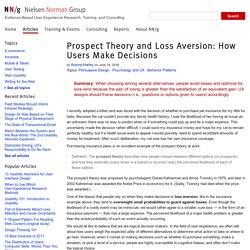
Because the cat couldn’t provide any family health history, I saw the likelihood of her having an issue as an unknown: there was no way to predict when or if something could pop up and be a major expense. This uncertainty made the decision rather difficult: I could save my insurance money and hope for my cat to remain perfectly healthy, but if a health issue were to appear I would possibly need to spend exorbitant amounts of money for treatment. After much deliberation, my cat now has her own insurance coverage. Purchasing insurance plans is an excellent example of the prospect theory at work. The Cost of Cooperating. I'm most interested in understanding cooperation, that is to say, why people are willing to act for the greater good rather than their narrow self-interest.
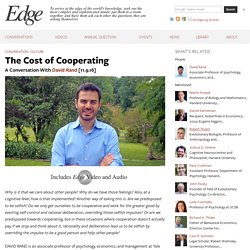
In thinking about that question, there's both a scientific part of understanding how the selfish process of natural selection and strategic reasoning could give rise to this cooperative behavior, and also the practical question of what we can do to make people more cooperative in real-world settings. The way that I think about this is at two general different levels. One is an institutional level. The Emerging Revolution in Game Theory - MIT Technology Review. The world of game theory is currently on fire.
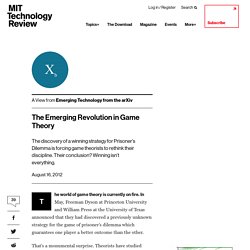
The Evolution of Trust. Mathematical mysteries: Survival of the nicest? Mar 2002 Survival of the nicest?
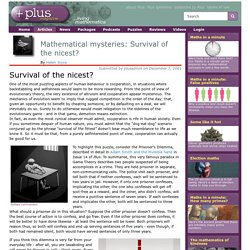
One of the most puzzling aspects of human behaviour is cooperation, in situations where backstabbing and selfishness would seem to be more rewarding. From the point of view of evolutionary theory, the very existence of altruism and cooperation appear mysterious. The mechanics of evolution seem to imply that rugged competition is the order of the day; that, given an opportunity to benefit by cheating someone, or by defaulting on a deal, we will inevitably do so. Surely to do otherwise would mean relegation to the sidelines of the evolutionary game - and in that game, demotion means extinction.
Claudia Hammond's Mind Over Money: This classic thought experiment explains the weird decisions we make about money — Quartz. Some years ago, I interviewed the Nobel prize-winning psychologist and bestselling author Daniel Kahneman.

He told me one of his all-time favorite thought experiments, which is something of a classic in behavioral economics. It involves a woman who has spent $160 on two theatre tickets. She is looking forward to the show, but when she arrives at the theatre she can’t find the tickets. She empties out her bag. She goes through her pockets. Twilight of the Nudges.
Second, plenty of critics question the propriety of nudges.
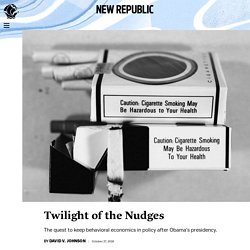
The idea of technocratic nannies shaping our choices and behavior behind the scenes smacks of gross manipulation. And even if we don’t always make the best decisions, and even if our welfare would be vastly improved by such maneuvering, what about our autonomy? Game theory’s cure for corruption? Make us all cops. Naturalists have long regarded ants and bees as a sort of living parable on the benefits of universal virtue.
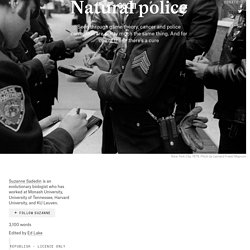
‘Karl Marx was right, socialism works,’ said the great ant specialist Edward O Wilson; ‘it’s just that he had the wrong species.’ Eclectic excerpts delivered to your email every day from editor Richard Vague. Today's encore selection -- from Wishful Drinking by Carrie Fisher.

Carrie Fisher, who played the role of Princess Leia for George Lucas in Star Wars: "George made me take shooting lessons because in the first film I would grimace horribly at the deafening sound of the blanks from the blasters and the squibs that the special effects team would place all over the set and on the stormtroopers. Harvard Magazine. “People care not only about outcomes, but about how outcomes came to be,” says associate professor of public policy Iris Bohnet of the Kennedy School of Government.
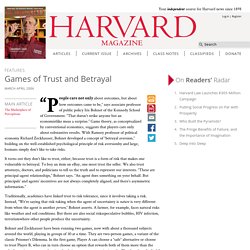
“That doesn’t strike anyone but an economistlike meas a surprise.” Game theory, as conceptualized by conventional economics, suggests that players care only about substantive results. With Ramsey professor of political economy Richard Zeckhauser, Bohnet developed a concept of “betrayal aversion,” building on the well-established psychological principle of risk aversionby and large, humans simply don’t like to take risks.
It turns out they don’t like to trust, either, because trust is a form of risk that makes one vulnerable to betrayal. To buy an item on eBay, one must trust the seller. Traditionally, academics have linked trust to risk tolerance, since it involves taking a risk. Capuchin monkeys reject unequal pay. Survival of the ... Nicest? Check Out the Other Theory of Evolution by Eric Michael Johnson. A new theory of human origins says cooperation—not competition—is instinctive. posted May 03, 2013 A century ago, industrialists like Andrew Carnegie believed that Darwin’s theories justified an economy of vicious competition and inequality.
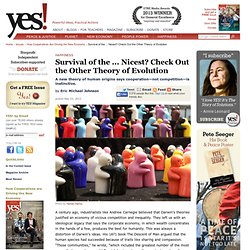
In rich and poor nations, giving makes people feel better than getting, research finds. Feeling good about spending money on someone else rather than for personal benefit may be a universal response among people in both impoverished countries and rich nations, according to new research published by the American Psychological Association. "Our findings suggest that the psychological reward experienced from helping others may be deeply ingrained in human nature, emerging in diverse cultural and economic contexts," said lead author Lara Aknin, PhD, of Simon Fraser University in Canada. The findings provide the first empirical evidence that "the warm glow" of spending on someone else rather than on oneself may be a widespread component of human psychology, the authors reported in the study published online in APA's Journal of Personality and Social Psychology.
Researchers found a positive relationship between personal well-being and spending on others in 120 of 136 countries covered in the 2006-2008 Gallup World Poll. Giving makes young children happy. If it is indeed nobler to give than to receive, it may also make you happier -- even if you're a toddler, according to a new study co-authored by three psychologists at the University of British Columbia. The study, published in PLoS One, an on-line journal from the Public Library of Science, finds that toddlers under the age of two are happier when giving treats to others than receiving treats themselves. Furthermore, children are happier when they give their own treats away than when they give an identical treat that doesn't belong to them. These findings support recent research showing that adults feel good when they help others and may help explain why people act pro-socially, even when doing so involves personal cost.
This is the first study to show that giving to others makes young children happy. Social scientists build case for 'survival of the kindest' Researchers at the University of California, Berkeley, are challenging long-held beliefs that human beings are wired to be selfish. In a wide range of studies, social scientists are amassing a growing body of evidence to show we are evolving to become more compassionate and collaborative in our quest to survive and thrive.
In contrast to "every man for himself" interpretations of Charles Darwin's theory of evolution by natural selection, Dacher Keltner, a UC Berkeley psychologist and author of "Born to be Good: The Science of a Meaningful Life," and his fellow social scientists are building the case that humans are successful as a species precisely because of our nurturing, altruistic and compassionate traits.
They call it "survival of the kindest. " "Because of our very vulnerable offspring, the fundamental task for human survival and gene replication is to take care of others," said Keltner, co-director of UC Berkeley's Greater Good Science Center. Do cheaters have an evolutionary advantage? Anyone who has crawled along in the left lane while other drivers raced up the right lane, which was clearly marked "lane ends, merge left," has experienced social cheating, a maddening and fascinating behavior common to many species.
Although it won't help with road rage, scientists are beginning to understand cheating in simpler "model systems," such as the social amoeba, Dictyostelium discoideum. At one stage in their life cycle thousands of the normally solitary Dicty converge to form a multicellular slug and then a fruiting body, consisting of a stalk holding aloft a ball of spores. It is during this cooperative act that the opportunity for cheating arises. Some amoebae ultimately become cells in the stalk of the fruiting body and die, while others rise to the top, and form spores that pass their genes to the next generation. Daniel Kahneman: The riddle of experience vs. memory. Daniel Kahneman on Making Smarter Decisions. The bestselling author of Thinking, Fast and Slow talks about overcoming the cognitive biases and errors that can affect decision-making. You can avoid decision-making mistakes by understanding the differences between these two systems of thought.
Dan Ariely: What Is Behavioral Economics? We're All Predictably Irrational - Dan Ariely. Motivation. The Overjustification Effect. The Misconception: There is nothing better in the world than getting paid to do what you love. The Truth: Getting paid for doing what you already enjoy will sometimes cause your love for the task to wane because you attribute your motivation as coming from the reward, not your internal feelings. Office Space – Courtesy Twentieth Century Fox Money isn’t everything.
Money can’t buy happiness. Don’t live someone else’s dream. The Simple Phrase that Increases Effort 40% What motivates us at work? 7 fascinating studies that give insights. How money helps us trust each other. What makes money essential for the functioning of modern society? An international group of researchers from Switzerland, Italy and the U.S. have shown through an experiment how money helps modern societies prosper by fostering cooperation among strangers. How Money Worries Can Scramble Your Thinking : Shots - Health News.
7 Weird Things Money Does To Your Brain. Photo Credit: Shutterstock.com June 24, 2014 | Like this article? Join our email list: Behavior Change Strategy Cards. Cognitive lode by ribot – Simple advice on product psychology. How we change what others think, believe, feel and do. Gamification. This Thing For Which We Have No Name. It's not my job to be a behavioral economist; my job is to actually popularize behavioral economics. Please, not another bias! An evolutionary take on behavioural economics. Below is a transcript of my planned presentation at today’s Marketing Science Ideas Xchange. MIND Guest Blog, Scientific American Blog Network. The views expressed are those of the author and are not necessarily those of Scientific American.